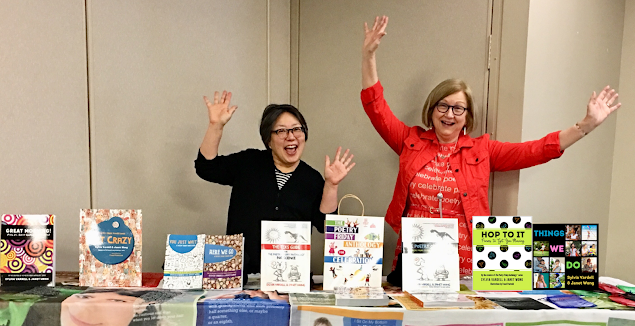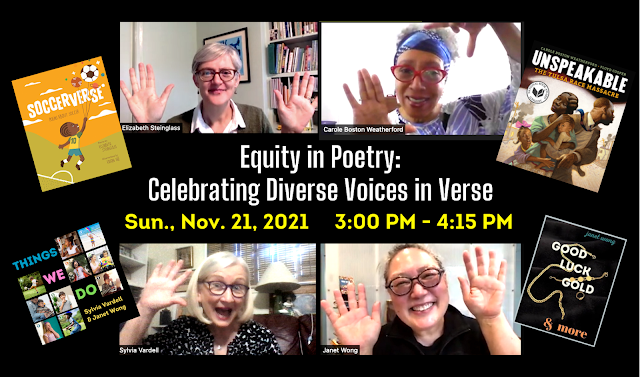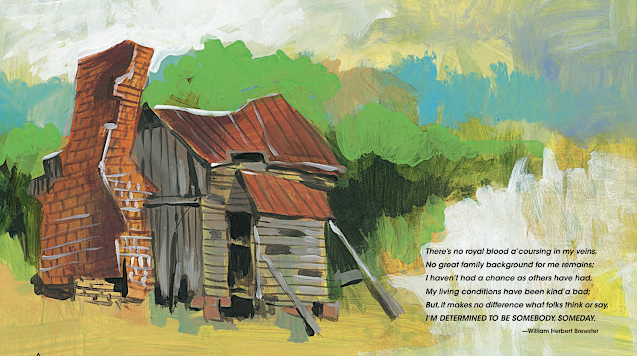My good friend and collaborator Janet Wong is receiving the NCTE Award for Excellence in Poetry for Children at the annual convention (virtually) next week. I am so excited and happy for her! In celebration, I persuaded her to do a Vogue-style interview with me. Here she answers 10 questions about her routines, her childhood, and her writing. Enjoy! (Click on the white triangle in the center to advance the video)
Thursday, November 11, 2021
Janet Wong: NCTE Award Winner
Friday, November 05, 2021
Guest Post: EVICTED! by Alice Faye Duncan
I'm happy to feature another guest post, this time from Alice Faye Duncan, author of the forthcoming picture book, EVICTED! You may remember her from picture book, A Song for Gwendolyn Brooks that I highlighted previously. Here, she writes about the backstory on writing this book about the Tent City Movement in Tennessee that laid the groundwork for the Voting Rights Act of 1965 and about Dr. William Herbert Brewster, whose poetry and songwriting were a huge influence on that time and on her own work.
Poems and Voting Rights
(Battles Worth the Fight)
How do you write a poem? It begins with an idea that graduates to gumption. Then you wade in the muddle. Write. Revise. Delete. Rewrite. To avoid discouragement, you accept that poems like all creative pursuits, start with disorder. You learn patience. You must. There is no exception as you rewrite and wait for words to sing and make sense. Every ending is the same. A finished poem is birthed in an alchemy of labor, babble, and stumbling. Every poem is a hard-won prize.
Nothing has tested my pursuit of poetry like the pandemic of 2020. Talk about hard-won writing as family and friends took ill. Some died. Despite sadness and loss, I plodded onward to write EVICTED—THE STRUGGLE FOR THE RIGHT TO VOTE. The illustrator is Charly Palmer. The publication date is January, 2022.
EVICTED! is the story of Black sharecroppers and the Tent City Movement that inspired John Lewis and college friends to tackle voting rights in the rural South. These Tennessee farmers and their uncelebrated names paved the way for the Voting Rights Act of 1965.
Conveyed through interconnected stories and told through the eyes of a child, EVICTED! combines poetry, prose, and illustrations to shine light on a forgotten history. I was unfamiliar with the Tent City Movement until 2006, when I attended a funeral and met the Memphis photojournalist, Ernest Withers.
Mr. Withers gave me a book of his famous civil rights photographs. The collection introduced me to sharecroppers and their sad-faced children, standing in a field. A caption said these black laborers were evicted from white farmland and forced to live in tents during 1960, because they registered to vote in Fayette County, Tennessee. Uncles and aunts in my mother’s family had farmed in Fayette County for five decades. I wanted to know more about this movement.
The Tent City story interested me for a second reason, too. Poet and songwriter, Dr. William Herbert Brewster was born in Fayette County, Tennessee. I had hopes that researching the history of the land would give me an understanding of Brewster’s creative fire.
William Herbert Brewster wrote the poem I’m Determined to be Somebody Someday. And he wrote classic gospel lyrics like Aretha Franklin’s Old Landmark and Mahalia Jackson’s, Move On Up a Little Higher.
Born to parents who survived American slavery, Dr. Brewster wielded words with a prolific pen. He wrote lyrics for 200 songs. The Smithsonian Institute dedicated a symposium to his genius in 1982. And according to biographer, Peter Guralnick, it was Dr. Brewster’s East Trigg Baptist Church, that partly contributed to Elvis Presley’s love for Gospel music.
I grew up in Memphis, Tennessee. During the seventies and eighties, every Black child in the city was required to memorize Dr. Brewster’s poem, I’m Determined to be Somebody Someday. During the early months of the pandemic as I slogged through the disorder of the creative process, Dr. Brewster’s words carried me.
I was determined to write EVICTED! and offer young learners poems to edify their understanding of voting rights. I was also intentional about making it clear that presently great threats loom over democracy and those American rights.
This is the power of poetry and why poets must persevere to unravel disorder in the creative process. Poems express weighty ideas in few words. Poems give young learners easy access to historical information. Pandemic or not—poems matter. And just like voting rights—poems are worth the struggle it takes to create them. Write ON!







